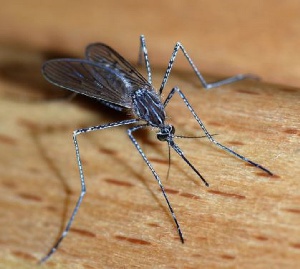Scientists reveal mosquitoes are becoming resistant to insecticides due to wrong application and misuse of chemicals.
It is the outcome of studies into monitor trends and the epidemiology of malaria in the Ghana.
Though malaria has dropped in some parts of Ghana, the Malaria Control Programme is still working to provide effective insecticides for rural communities.
It is about 5:30 pm here at the Agamal Malaria Control Laboratory at Obuasi and Joseph Mwinikubu and Paul Osei Bonsu are monitoring development stages of mosquitoes.
The laboratory is where mosquitoes are kept for malaria testing. Adult mosquitoes are transferred and trapped in another room.
It is the final stage where mosquitoes are tested to ascertain whether they have malaria-causing parasite or not.
Entomology laboratory technologist, Paul Osei Bonsu says the results from their studies indicate they are impact from their indoor spraying.
“We test to see whether they are absence or presence of parasite in the mosquitoes. Once we have more negative test results, which mean they are no parasite in the mosquitoes.” He says.
Negative results also mean that, Agamal malaria control laboratory is wiping out adult mosquitoes and so mosquitoes are not living long enough to pick parasites from human beings and transmit.
Initially the malaria control laboratory had a lot of positives that showed presence of parasite in the mosquitos’ population.
That raised questions about what households do to maintain a good mosquito-resistant environment when malaria infection goes down.
Studies by Amalga Malaria Control reveal mosquitoes are developing resistance to chemical use in indoor spray.
“The mosquitoes build up resistant to the old chemical we used. We needed a new insecticide with a new mode of action that can kill the mosquitoes.
Continued resistance may lead to more complex challenges as the National Malaria Control Program seeks to vary recommended chemicals.
Programme Director, Dr. Keziah Malm, says her outfit would continue to spray once mosquitoes continue to breed.
She stated that “they have not been able to clear off the breeding site of the mosquitoes.
Dr. Malm says the old insecticide used wasn’t more effective .
Many communities in Ghana are benefiting from mass spraying of the new chemical 3rd Generation IRS Insecticide Sumishield 50 WG.
Communities in the Upper East, Upper West, Ashanti region among others are the beneficial group.
Health News of Wednesday, 9 May 2018
Source: www.ghanaweb.com
Mosquitoes becoming resistant to insecticides – Entomologist reveals
Entertainment












